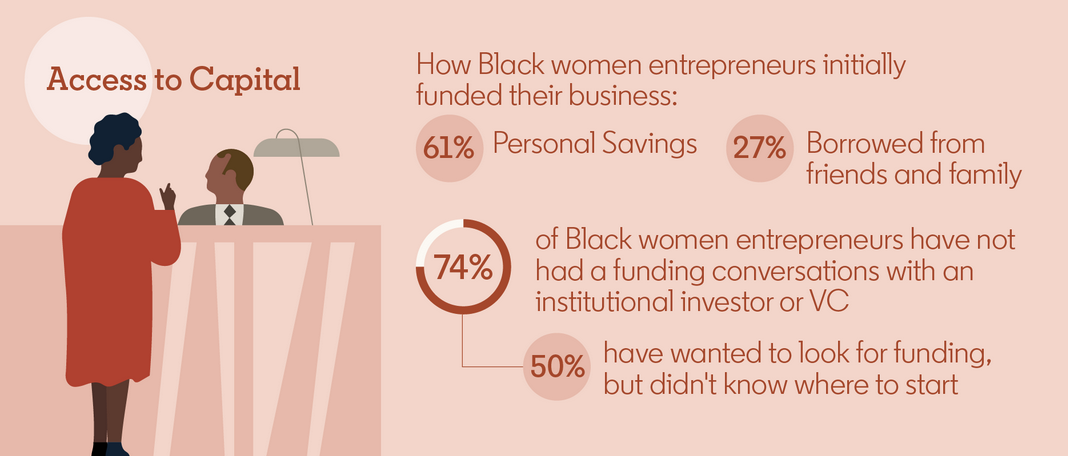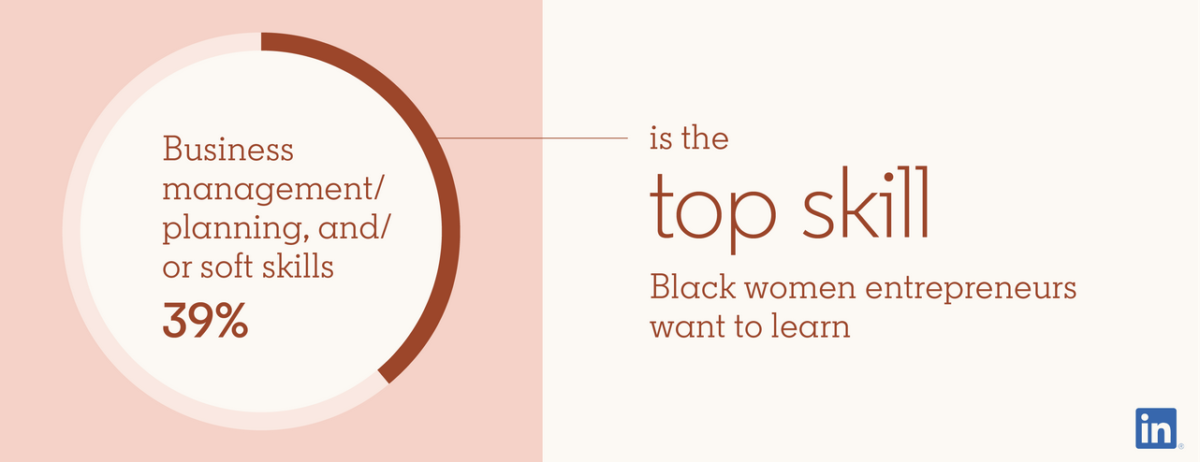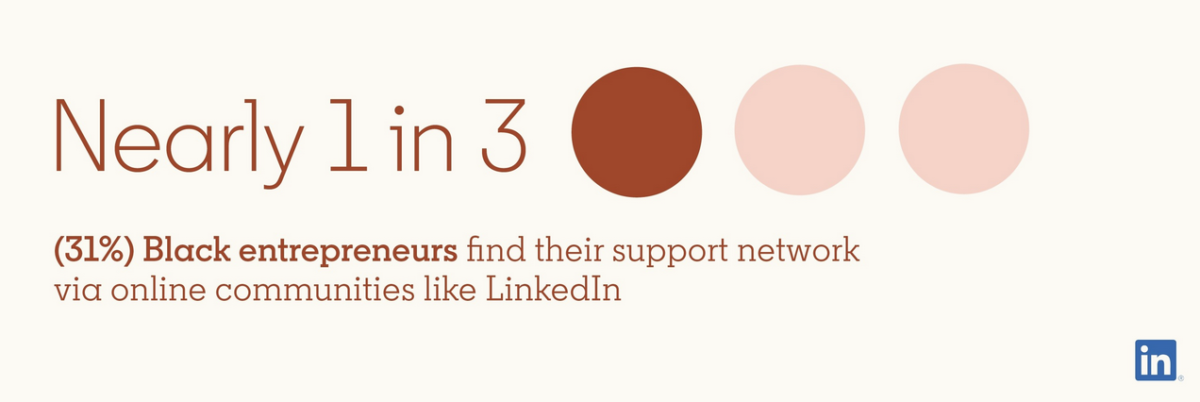In 1900, James Weldon Johnson penned the poem, “Lift Every Voice And Sing.” Later, his brother J. Rosamond Johnson would put music to that poem, which would be one day known as the Black National Anthem. Written initially to commemorate the birthday of President Abraham Lincoln, the anthem is now a song of pride for Black people and speaks to the audacity of hope and a future far beyond many people’s wildest dreams.
For years, Black men and women have latched on to that audacity, and through innovation and an entrepreneurial spirit, they created a life and a future they could be proud of. As the United States celebrates Black Business Month in August, it is a time to reflect on the glorious past and strategize for a more promising future.
LinkedIn is a partner in that strategic effort and collaborated with YouGov to gather data about the state of Black businesses that can help shed light on the great strides the community has made and the opportunities to advance.
During its research period, LinkedIn and YouGov conducted an online survey between Jan. 20 to Feb. 1, 2022, of 1,000 Black entrepreneurs, ages 18-69, in the U.S. The data explores the various ambitions, challenges, and realities that Black entrepreneurs face.
Acknowledge The Elephant In The Room
While there were many intriguing data points, the most pressing but likely least shocking is that Black entrepreneurs’ top challenge is accessing capital. According to the data, 50 percent of Black business owners understand the need for funding but don’t know where to start looking to access it. In fact, nearly two in every three Black entrepreneurs start their business using personal savings versus accessing investor funds.
The struggle to access capital is evidence of a systemic problem rearing its ugly head, making it increasingly difficult for business owners to realize their dreams. This systemic barrier becomes stronger among Black women business owners.
“While Black women may now be starting businesses at a record pace, they’re still having to overcome massive obstacles in doing so. Only three percent of Black women are running mature businesses and are two times as likely to be turned down for loans,” Drew McCaskill, Career Expert for LinkedIn exclusively told AfroTech. “You know, when we surveyed Black women business owners, 66 percent described access to credit and funds for expansion as one of their greatest financial challenges.”

A few of the ways in which McCaskill believes Black women entrepreneurs can gain the needed support to help their businesses thrive is by changing their evaluation model, building their connections, and honing their skills.
“According to Crunchbase, the percentage of global venture capital (VC) funding that went to women founders dropped from 2.9 percent to 2.3 percent in 2020, and among those founders, less than 0.35 percent were Black women.”
“Our survey found that 39 percent of Black women founders said that business management/planning and soft skills were the top skill they wanted to learn to advance their business. We must invest in programs like Blavity.org or Digital Undivided that provide training and skills for diverse entrepreneurs,” McCaskill continued.

Your Network Supports Your Net Worth
Although gaining access to capital may be one of the most significant challenges to Black entrepreneurship, it isn’t an impossible task. With 35% of Black business owners being discriminated against for funds, one of the tools entrepreneurs can tap into is the power of networking.
“You never know where your next funding opportunity will come from. Black business owners often lack access to the networks that could help connect them to economic opportunities. LinkedIn research found that 58 percent of Black business owners believe they would be more successful if they had a ‘stronger’ network,” McCaskill explained.
The LinkedIn career expert also emphasized that a business owner’s network needs to be diverse and represent various life experiences and skills that will add value to their business. Also, don’t frown on grant and funding opportunities that prioritize the most popular folks at the proverbial lunch table – diversity, equity, and inclusion.
The Business Happy Hour Maximized
Beyond building up their personal network, organizations like LinkedIn are leading the charge to provide resources to combat Black entrepreneurs’ present challenges. With one in four entrepreneurs noting that they lack mentoring opportunities, LinkedIn is leveraging this data point to secure itself as a curator that connects people in ways most beneficial to their businesses.
“At LinkedIn, our goal is to empower businesses and professionals to connect and work together. With more business being done online and more folks turning to entrepreneurship, we see the power in using LinkedIn as a ‘digital storefront,'” McCaskill emphasized.
With a nearly 800-million-member community, LinkedIn has witnessed people use this massive network to their benefit and tap into the platform’s tools to share and promote their services to a wide range of people they otherwise would not have access to.
With about 31 percent of Black entrepreneurs finding support online in spaces like LinkedIn, resources like LinkedIn Pages, Sales Navigator, and LinkedIn Learning provide fertile ground for entrepreneurs to grow their brand, generate new leads, establish partnerships and make connections.

In addition to being a source of connection and amplifying its Services Marketplace, LinkedIn has announced a new $500,000 grant to support programs and organizations that advance and accelerate Black entrepreneurship specifically.
A New Kind Of Line Dance
As the ecosystem of the job market evolves, so does the ambition of entrepreneurship. Based on the data gathered from LinkedIn’s and YouGov’s research, 55 percent of Black entrepreneurs left their corporate jobs for more flexibility. Of the remaining surveyed, 48 percent desired more financial security, 30 percent wanted more purpose-driven work, and one in five Black entrepreneurs left because they felt their jobs were not invested in their growth.
These factors and more birthed the phenomenon known as The Great Reshuffle. The Great Reshuffle is a time when Black employees everywhere have been reimagining not just where they work, but how and why they work.
“Black professionals are gravitating toward entrepreneurship at incredible rates, whether they take on a side hustle while working a full-time job or leave the corporate workforce altogether to start their business venture. The numbers are staggering – in fact, the number of African-American business owners in operation surged to almost 1.5 million in August 2021, up 38 percent from February 2020, according to data from the University of California, Santa Cruz,” McCaskill pointed out.
From the days of Reconstruction to the glory of Black Wall Street and to the ubiquitous nature of Black businesses today – the Johnson brothers’ lyrics from “Lift Every Voice And Sing” have a prophetic tone as the world navigates the joys and pains of Black entrepreneurship.
“Facing the rising sun of our new day begun, Let us march on till victory is won.”


